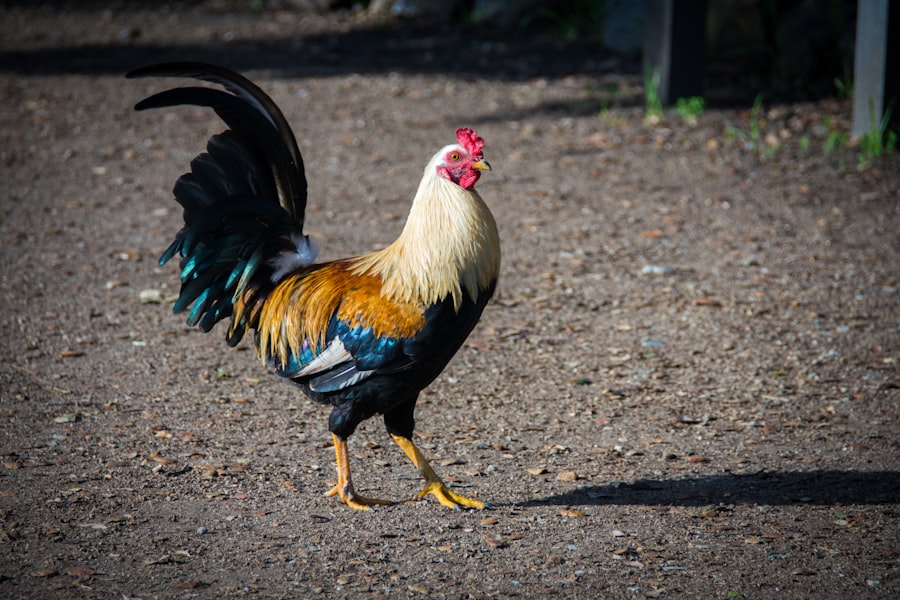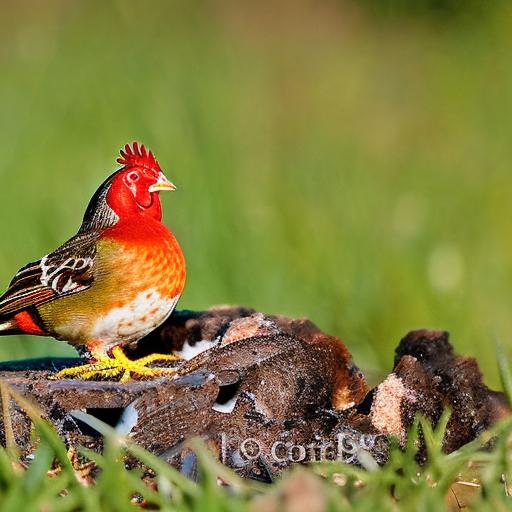Keeping chickens in your backyard has become a growing trend in recent years. More and more people are realizing the benefits of having their own flock of chickens, whether it’s for fresh eggs, as pets, or for the use of chicken manure as fertilizer. In this article, we will explore the various aspects of keeping chickens in your backyard, including legal requirements, types of chicken coops, choosing the right breed of chickens, feeding and caring for them, health and hygiene considerations, dealing with predators and pests, and harvesting eggs and using chicken manure as fertilizer.
Key Takeaways
- Keeping chickens in your backyard has many benefits, including fresh eggs, natural pest control, and fertilizer for your garden.
- Before starting, it’s important to research and comply with local legal requirements for keeping backyard chickens.
- There are various types of chicken coops available, each with different features and benefits.
- Choosing the right breed of chickens for your backyard depends on factors such as egg production, temperament, and climate.
- Feeding and caring for backyard chickens requires attention to their diet, water supply, and living conditions, as well as regular health checks and hygiene practices.
Benefits of keeping chickens in your backyard
One of the main benefits of keeping chickens in your backyard is having a constant supply of fresh eggs. There is nothing quite like collecting eggs from your own flock every morning and knowing exactly where they came from. Not only are fresh eggs delicious, but they are also more nutritious than store-bought eggs. Chickens that are allowed to roam freely in a backyard environment produce eggs that are higher in omega-3 fatty acids and vitamin E.
Another benefit of keeping chickens in your backyard is the companionship they provide. Chickens can be wonderful pets and can form strong bonds with their owners. They are social animals that enjoy human interaction and can be quite entertaining to watch. Many people find that spending time with their chickens is a great way to relax and de-stress.
In addition to fresh eggs and companionship, another benefit of keeping chickens in your backyard is the use of chicken manure as fertilizer. Chicken manure is rich in nutrients and can greatly improve the quality of your soil. By using chicken manure as fertilizer, you can reduce the need for chemical fertilizers and promote healthier plant growth.
Legal requirements for keeping backyard chickens
Before you decide to keep chickens in your backyard, it’s important to familiarize yourself with the legal requirements in your area. Some cities or neighborhoods may have specific regulations regarding the keeping of chickens. These regulations may include the number of chickens allowed, the size and location of the coop, and any permits or licenses that may be required.
In some areas, you may need to obtain a permit or license to keep chickens in your backyard. This is usually done to ensure that the chickens are being kept in a safe and sanitary manner. The process for obtaining a permit or license may vary depending on where you live, so it’s important to check with your local government or animal control agency for specific requirements.
Zoning restrictions may also apply to backyard chicken keeping. Some neighborhoods may have restrictions on the types of animals that can be kept, the size of the property required, or the distance between the coop and neighboring properties. It’s important to check with your local zoning department to determine if there are any restrictions that apply to you.
Types of chicken coops and their features
When it comes to choosing a chicken coop for your backyard, there are several options available. The type of coop you choose will depend on factors such as the size of your flock, the space available in your backyard, and your personal preferences.
One common type of chicken coop is the traditional wooden coop. These coops are typically made from wood and have a simple design with a nesting area and a roosting area. They often have a small door for the chickens to enter and exit, as well as windows for ventilation. Wooden coops can be purchased pre-made or built from scratch.
Another type of chicken coop is the mobile coop, also known as a chicken tractor. These coops are designed to be moved around your backyard, allowing your chickens to graze on fresh grass while still being protected from predators. Mobile coops are usually made from lightweight materials such as PVC pipe or wire mesh and can be easily moved by one person.
A third option is the hoop coop, which is a variation of the mobile coop. Hoop coops are typically made from PVC pipe or metal hoops covered with wire mesh or plastic. They have a curved shape, which provides ample space for the chickens to move around and allows for good air circulation. Hoop coops are easy to build and can be moved around your backyard as needed.
Each type of chicken coop has its own set of features and benefits. Traditional wooden coops are sturdy and provide good protection from predators, but they may require more maintenance and cleaning. Mobile coops are convenient and allow for rotational grazing, but they may not provide as much protection from predators. Hoop coops are easy to build and move, but they may not be as durable as other types of coops.
Choosing the right breed of chickens for your backyard
When it comes to choosing the right breed of chickens for your backyard, there are several factors to consider. The breed you choose will depend on factors such as the climate in your area, the space available in your backyard, and your personal preferences.
There are many different breeds of chickens available, each with its own set of characteristics. Some breeds are known for their egg-laying abilities, while others are known for their meat production or ornamental qualities. It’s important to choose a breed that suits your needs and fits well with your backyard environment.
For example, if you’re primarily interested in having a constant supply of fresh eggs, you may want to consider breeds such as the Rhode Island Red or the Leghorn. These breeds are known for their high egg production and can lay up to 300 eggs per year. They are also hardy and adaptable to different climates.
If you’re interested in raising chickens for meat, you may want to consider breeds such as the Cornish Cross or the Plymouth Rock. These breeds are known for their fast growth rate and meat quality. They are also relatively easy to care for and can adapt well to different environments.
If you’re looking for chickens that are more ornamental in nature, you may want to consider breeds such as the Silkie or the Polish. These breeds have unique feather patterns and are often kept for their aesthetic appeal. They are also known for their friendly and docile nature, making them great pets.
Each breed of chicken has its own set of pros and cons. Some breeds may be more prone to certain health issues or may require specific care. It’s important to do your research and choose a breed that fits well with your backyard environment and your personal preferences.
Feeding and caring for backyard chickens

Feeding and caring for backyard chickens is relatively simple, but it’s important to provide them with the proper nutrition and care to ensure their health and well-being.
Chickens require a balanced diet that includes a combination of grains, protein, vitamins, and minerals. There are several different types of feed available for chickens, including commercial feeds, homemade feeds, and organic feeds. Commercial feeds are convenient and provide a balanced diet for chickens, but they may contain additives or preservatives. Homemade feeds allow you to control the ingredients and quality of the feed, but they require more time and effort to prepare. Organic feeds are made from organic ingredients and do not contain any synthetic additives or pesticides.
In addition to feed, it’s important to provide clean water for your chickens at all times. Chickens require fresh water to stay hydrated and maintain their overall health. Water should be provided in a clean container that is large enough for all of your chickens to drink from at once. It’s also important to regularly clean and refill the water container to prevent the growth of bacteria or algae.
Caring for backyard chickens also involves providing them with a clean and comfortable living environment. The coop should be cleaned regularly to remove droppings, feathers, and other debris. It’s also important to provide adequate ventilation to prevent the buildup of ammonia and other harmful gases. Bedding material such as straw or wood shavings should be provided in the nesting area and roosting area to keep the chickens comfortable and to absorb moisture.
Health and hygiene considerations for backyard chickens
Keeping your chickens healthy is essential for their well-being and productivity. There are several steps you can take to ensure that your chickens stay healthy and free from disease.
One of the most important aspects of chicken health is providing them with a clean living environment. The coop should be cleaned regularly to remove droppings, feathers, and other debris. This will help prevent the buildup of bacteria and parasites that can cause disease. It’s also important to provide adequate ventilation to prevent the buildup of ammonia and other harmful gases.
Regular health checks are also important for keeping your chickens healthy. You should regularly inspect your chickens for any signs of illness or injury, such as lethargy, loss of appetite, or abnormal behavior. If you notice any signs of illness, it’s important to take action immediately by isolating the sick chicken and seeking veterinary care if necessary.
Another important aspect of chicken health is providing them with a balanced diet. Chickens require a combination of grains, protein, vitamins, and minerals to stay healthy. It’s important to provide them with a high-quality feed that meets their nutritional needs. You can also supplement their diet with fresh fruits and vegetables, as well as kitchen scraps such as leftover grains or vegetables.
Dealing with predators and pests in your backyard chicken coop
Predators and pests can pose a threat to your backyard chickens, so it’s important to take steps to protect them from harm.
Common predators that may target chickens include raccoons, foxes, coyotes, dogs, cats, and birds of prey. To protect your chickens from these predators, it’s important to secure the coop and run with sturdy fencing that is buried at least a foot into the ground to prevent digging. You should also cover the top of the run with wire mesh or netting to prevent birds of prey from swooping down and grabbing your chickens.
In addition to predators, there are also several pests that can cause problems in your chicken coop. These pests include mites, lice, fleas, ticks, and rodents. To prevent infestations, it’s important to regularly clean and disinfect the coop, as well as provide your chickens with dust baths to help control parasites. You should also store feed in airtight containers to prevent rodents from accessing it.
Regular coop maintenance is also important for preventing predators and pests. You should regularly inspect the coop for any signs of damage or weakness, such as holes in the fencing or loose boards. It’s also important to repair any damage immediately to prevent predators from gaining access to your chickens.
Harvesting eggs and using chicken manure as fertilizer
Harvesting eggs from your backyard chickens is a rewarding experience. There are several best practices you can follow to ensure that you harvest eggs safely and efficiently.
First, it’s important to provide your chickens with clean nesting boxes where they can lay their eggs. The nesting boxes should be filled with clean bedding material such as straw or wood shavings. You should also collect eggs daily to prevent them from becoming dirty or damaged.
When collecting eggs, it’s important to handle them gently to avoid cracking or breaking them. You should also wash your hands before and after handling eggs to prevent the spread of bacteria. It’s best to store eggs in a cool place, such as a refrigerator, until you are ready to use them.
In addition to harvesting eggs, you can also use chicken manure as fertilizer for your garden or plants. Chicken manure is rich in nutrients such as nitrogen, phosphorus, and potassium, which are essential for plant growth. To use chicken manure as fertilizer, it’s important to compost it first to allow it to break down and decompose. This will help eliminate any harmful bacteria or pathogens that may be present in the fresh manure. Once the manure has composted, you can spread it on your garden or plants to improve soil fertility and promote healthy plant growth.
Is keeping backyard chickens right for you?
Keeping backyard chickens can be a rewarding and fulfilling experience, but it’s important to do your research and consider if it’s the right choice for you. There are many benefits to keeping chickens in your backyard, including fresh eggs, companionship, and the use of chicken manure as fertilizer. However, there are also legal requirements, considerations for choosing the right breed, feeding and caring for chickens, health and hygiene considerations, dealing with predators and pests, and harvesting eggs and using chicken manure as fertilizer.
Before deciding to keep backyard chickens, it’s important to familiarize yourself with the legal requirements in your area and ensure that you have the necessary permits or licenses. You should also consider the space available in your backyard and choose a suitable type of chicken coop. It’s important to choose the right breed of chickens for your needs and provide them with a balanced diet and proper care. You should also take steps to keep your chickens healthy and protect them from predators and pests.
In conclusion, keeping backyard chickens can be a rewarding and enjoyable experience. It allows you to have a constant supply of fresh eggs, provides companionship, and allows you to use chicken manure as fertilizer. However, it’s important to do your research and consider if keeping chickens is right for you. By following the proper guidelines and taking good care of your chickens, you can enjoy all the benefits that come with backyard chicken keeping.
We encourage readers to do their own research and consider if keeping backyard chickens is right for them. If you have any experience or tips to share, we would love to hear from you. Feel free to leave a comment and share your own experiences with backyard chicken keeping.
If you’re considering keeping chickens in your backyard, you’ll want to make sure you have a suitable chicken coop and run. Poultry Wizard offers a helpful article on chicken coop and run plans that can guide you through the process of building a safe and comfortable home for your feathered friends. Check out their article at https://poultrywizard.com/keeping-chickens/chicken-coop-run-plans/ for expert tips and advice. Additionally, if you’re concerned about keeping your chickens warm during colder months, Poultry Wizard also has an informative article on how to insulate a chicken coop. Find out more at https://poultrywizard.com/keeping-chickens/how-to-insulate-a-chicken-coop/.
FAQs
What are the benefits of keeping chickens in my backyard?
Keeping chickens in your backyard can provide you with fresh eggs, natural pest control, and fertilizer for your garden. They also make great pets and can be a fun and educational experience for children.
What are the legal requirements for keeping chickens in my backyard?
The legal requirements for keeping chickens in your backyard vary depending on your location. Some cities and towns have specific regulations regarding the number of chickens you can keep, the size of your coop, and the distance it must be from your property line. It is important to check with your local government to ensure you are following all regulations.
What kind of space do I need to keep chickens in my backyard?
Chickens require a coop for shelter and a run for exercise. The size of your coop and run will depend on the number of chickens you plan to keep. As a general rule, each chicken needs at least 4 square feet of coop space and 10 square feet of run space.
What do I need to feed my backyard chickens?
Chickens require a balanced diet of protein, carbohydrates, and vitamins. You can feed them a commercial chicken feed or supplement their diet with kitchen scraps, fruits, and vegetables. It is important to provide them with fresh water at all times.
What are the potential health risks of keeping chickens in my backyard?
Chickens can carry diseases such as salmonella, so it is important to practice good hygiene when handling them. Wash your hands thoroughly after handling chickens or their eggs. It is also important to keep your coop clean and free of pests to prevent the spread of disease.
Meet Walter, the feathered-friend fanatic of Florida! Nestled in the sunshine state, Walter struts through life with his feathered companions, clucking his way to happiness. With a coop that’s fancier than a five-star hotel, he’s the Don Juan of the chicken world. When he’s not teaching his hens to do the cha-cha, you’ll find him in a heated debate with his prized rooster, Sir Clucks-a-Lot. Walter’s poultry passion is no yolk; he’s the sunny-side-up guy you never knew you needed in your flock of friends!







